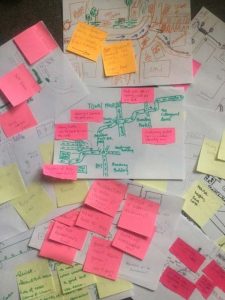YES Planning is a student volunteer project which offers town planning students training in engagement skills and which, in turn, extends an understanding of town planning amongst young people in the community. Through this initiative, it is hoped that young people in the region will be inspired to become involved, not only in local planning issues but also in wider democratic processes in the longer term. For the town planning students, YES Planning allows them to learn how to share their subject with a broader audience and to learn how to listen to young people’s views about the local environment.
The findings of the project have been turned into an engagement toolkit to enable town planners, teachers and youth workers to start to explore young people’s views about their local area.
In this post one of Yes Planning’s newest first year recruits reflects on a training session that was run by students in November 2016. The students, Sean Peacock and Ben Million had been instrumental in setting up the project three years ago.
*
The training session that Sean and Ben ran helped us to get to know what the YES Planning opportunity was all about, as beforehand I was unsure. We were told about the aims of the project and about the praise the project had received in the past which was great – everyone got to know what a fantastic opportunity they were getting involved in. We got to participate in some of the activities we would run with the pupils on a future school visit which I thought was really helpful, as opposed to just being told about the activities. This was also useful for the facilitators of YES Planning, as volunteers could give feedback on the activities, which might have been more difficult to get from children of such a young age. We discussed what challenges we might face working with groups of children and how we could overcome these challenges to get the best possible data from the pupils, through utilisation of the tasks we had been taught about.

Cognitive Mapping Skills
I felt like we were all well prepared for the school visit because of the training session, and I personally found the school visit very rewarding and insightful.
I look forward to the next opportunity YES Planning presents!
Amy Ingle, Stage 1 Urban Planning
*
For more information about YES Planning please contact Teresa Strachan, Lecturer in Town Planning, Teresa.Strachan@ncl.ac.uk
